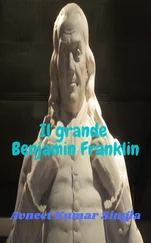Wiliam Bruce - Benjamin Franklin; Self-Revealed, Volume 2 (of 2)
Здесь есть возможность читать онлайн «Wiliam Bruce - Benjamin Franklin; Self-Revealed, Volume 2 (of 2)» — ознакомительный отрывок электронной книги совершенно бесплатно, а после прочтения отрывка купить полную версию. В некоторых случаях можно слушать аудио, скачать через торрент в формате fb2 и присутствует краткое содержание. Жанр: foreign_antique, foreign_prose, на английском языке. Описание произведения, (предисловие) а так же отзывы посетителей доступны на портале библиотеки ЛибКат.
- Название:Benjamin Franklin; Self-Revealed, Volume 2 (of 2)
- Автор:
- Жанр:
- Год:неизвестен
- ISBN:нет данных
- Рейтинг книги:4 / 5. Голосов: 1
-
Избранное:Добавить в избранное
- Отзывы:
-
Ваша оценка:
- 80
- 1
- 2
- 3
- 4
- 5
Benjamin Franklin; Self-Revealed, Volume 2 (of 2): краткое содержание, описание и аннотация
Предлагаем к чтению аннотацию, описание, краткое содержание или предисловие (зависит от того, что написал сам автор книги «Benjamin Franklin; Self-Revealed, Volume 2 (of 2)»). Если вы не нашли необходимую информацию о книге — напишите в комментариях, мы постараемся отыскать её.
Benjamin Franklin; Self-Revealed, Volume 2 (of 2) — читать онлайн ознакомительный отрывок
Ниже представлен текст книги, разбитый по страницам. Система сохранения места последней прочитанной страницы, позволяет с удобством читать онлайн бесплатно книгу «Benjamin Franklin; Self-Revealed, Volume 2 (of 2)», без необходимости каждый раз заново искать на чём Вы остановились. Поставьте закладку, и сможете в любой момент перейти на страницу, на которой закончили чтение.
Интервал:
Закладка:
That best portion of a good man's life, —
His little, nameless, unremembered acts
Of Kindness and of Love.
CHAPTER II
Franklin as a Man of Business
When some one said to Erskine that punning was the lowest kind of wit, he replied that the statement was true, because punning was the foundation of all wit.
The business career of Franklin did not move upon such an exalted plane as his scientific or political career, but it was the basis on which the entire superstructure of his renown as a philosopher and a statesman was built up; inasmuch as it was his early release from pecuniary cares which enabled him to apply himself with single-minded devotion to electrical experiments, and to accept at the hands of the people of Pennsylvania the missions to England which opened up the wider horizon of his postmeridian life. Quite apart, however, from the scientific and political reputation, to which his material success smoothed the way, his business career has an intrinsic interest of its own. In itself alone, when the limited opportunities afforded by Colonial conditions for the accumulation of a fortune are considered, it is a remarkable illustration of the extent to which sleepless energy and wise conduct rise superior to the most discouraging circumstances. Comparatively few young men aspire to be philosophers or statesmen, but almost every young man of merit finds himself under the necessity of striving for a pecuniary independence or at any rate for a pecuniary livelihood. How this object can be most effectually accomplished, is the problem, above all others in the world, the most importunate; and the effort to solve it from generation to generation is one of the things that invest human existence with perpetual freshness. To a young man, involved in the hopes and anxieties of his first struggles for a foothold in the world, the history of Franklin, as a business man, could not but be full of inspiration, even if it had not flowered into higher forms of achievement, and were not reflected in publications of rare literary value. But, putting altogether out of sight the great fame acquired by Franklin in scientific and political fields, a peculiar vividness is imparted to his business career by other circumstances which should not be overlooked. His main calling was that of a printer, a vocation of unusual importance and influence in a free community. "I, Benjamin Franklin, of Philadelphia, printer, late Minister Plenipotentiary from the United States of America to the Court of France, now President of the State of Pennsylvania," is the way in which he describes himself in his will executed less than two years before his death. And from that day to this, upon one memorable occasion or another, guilds of printers on both sides of the Atlantic have acclaimed him as little less than the patron saint of their craft.
Two of his commercial enterprises were the Pennsylvania Gazette , the most readable newspaper of Colonial America, and Poor Richard's Almanac , the only almanac that has ever attained the rank of literature. And finally the story of Franklin's business vicissitudes and the fortune, that he ultimately won, has been pictured with incomparable distinctness in the fascinating Autobiography . There he has set forth, as no other man with such lowly beginnings has had the genius to set forth, the slow, painful progress of a printer and merchant, under harsh and rigid conditions, from poverty to wealth. That fortune cannot be won under such circumstances except by the exercise of untiring industry, pinching frugality and unceasing vigilance, but that, with good health, good character, unquailing courage and due regard to Father Abraham's harangue, every man can conquer adversity, is the moral which the Autobiography has for the youth who has no inheritance but his own hands or brain. It is sad to reflect how much more impressive and stimulating this moral would be, if the Autobiography did not also disagreeably remind us that pecuniary ideals subject human character to many peculiar temptations of their own, and that, as the result of the destructive competition, which extends even to the sapling struggling in the thick set copse for its share of light and air, the success of one man in business is too often founded upon the ruins of that of another.
The business life of Franklin began when he was ten years old. At that age, he was taken from Mr. Brownell's school in Boston, and set to the task at the Blue Ball, his father's shop, of "cutting wick for the candles, filling the dipping mold and the molds for cast candles, attending the shop, going of errands, etc." At this he continued until he was twelve years of age, but his duties were so distasteful to him that his father feared that, unless he could find some more congenial occupation for him, he would run off to sea. To avert this danger, Josiah sometimes took Benjamin about with him, and showed him joiners, bricklayers, turners, braziers and other artisans at their several trades in the hope of awakening an inclination in him for one of them. The walks were not unprofitable to the son.
It has ever since [he says in the Autobiography ] been a pleasure to me to see good workmen handle their tools; and it has been useful to me, having learnt so much by it as to be able to do little jobs myself in my house when a workman could not readily be got, and to construct little machines for my experiments, while the intention of making the experiment was fresh and warm in my mind.
After this circuit of the various handicrafts, Josiah decided to make a cutler of Benjamin, and he placed him on probation with Samuel Franklin, a cutler, and a son of Josiah's brother, Benjamin. But Samuel thought that he should be paid a fee for instructing his cousin, and the suggestion was so displeasing to Josiah that he took the lad back to his own home. He doubtless felt that Samuel might have remembered whose roof it was that had sheltered his father when the latter first came over from England to Boston.
The real inclination, however, that Benjamin discovered at this period of his life was for books. His father observed it, and decided to make a printer of him, and it was when James, an older son of Josiah, returned from England, with a press and letters, to set up as a printer at Boston, that Benjamin was finally persuaded to enter into indentures of apprenticeship with him. He did not yield at once, because, while he preferred the business of a printer to that of a tallow chandler, the salt of the sea was still in his blood. Under the provisions of the indentures, he was to serve as his brother's apprentice, until he was twenty-one years of age, but he was to be allowed the wages of a journeyman during the last year of the apprenticeship. It was a fortunate thing for the apprentice that he should have become bound to a master, who had been trained for his craft in London, and the extraordinary skill which he early acquired as a printer was probably due in part to this circumstance. Among the publications printed by James, while the apprenticeship lasted, were Stoddard's Treatise on Conversion , Stone's Short Catechism and A Prefatory Letter about Psalmody . These publications were all of the kind that Franklin afterwards came to regard as hopelessly dry pemmican. Other publications, printed by James Franklin, during the same time, were various New England sermons, The Isle of Man, or Legal Proceedings in Manshire against Sin , an allegory, A Letter from One in the Country to his Friend in Boston , News from the Moon , A Friendly Check from a kind Relation to the Chief Cannoneer and A Word of Comfort to a Melancholy Country – all political pamphlets, – several papers on inoculation, and a production bearing the quaint title Hooped Petticoats Arraigned by the Light of Nature and the Law of God . But it was through a publication of a very different nature from these that James Franklin has come to occupy his position of prominence in the life of his apprentice. This publication was the New England Courant , already mentioned above. Its first issue appeared at Boston on August 21, 1721, and so bold were its pungent comments upon the clergy and magistrates of the Colony that, within a year, James Franklin was by the Council summoned before it for what it conceived to be highly injurious reflections upon the civil authorities. The reflections consisted in this: A letter from Newport in the Courant for June 11, 1722, stated that a piratical vessel had been seen off Block Island, and that two vessels were being fitted out to pursue her. "We are advised from Boston," was the conclusion of the letter, "that the Government of the Massachusetts are fitting out a ship (The Flying Horse) to go after the pirates, to be commanded by Captain Peter Papillon, and 'tis thought he will sail some time this month, wind and weather permitting." The letter, of course, was fictitious, and but a mild piece of satire in comparison with some of the prior utterances of the Courant . But this time the magistracy of the Colony was too much exasperated by the past misdemeanors of the Courant to overlook such a gibe at the expense of its activity. When questioned by the Council, James admitted that he was the owner of the paper, but refused to disclose the name of the author of the offensive letter. Benjamin was questioned, too, and united in the refusal. This was excusable in him as it was a point of honor for an apprentice not to betray his master's secrets, but James had no such plea behind which to shelter himself. Indeed, his bearing before the Council appears to have been too haughty to warrant the idea that he was much concerned about bringing forward any sort of defence. The examination resulted in a decision by the Council that the letter was "a high affront to the Government" and an order to the Sheriff to commit James to the Boston Jail.
Читать дальшеИнтервал:
Закладка:
Похожие книги на «Benjamin Franklin; Self-Revealed, Volume 2 (of 2)»
Представляем Вашему вниманию похожие книги на «Benjamin Franklin; Self-Revealed, Volume 2 (of 2)» списком для выбора. Мы отобрали схожую по названию и смыслу литературу в надежде предоставить читателям больше вариантов отыскать новые, интересные, ещё непрочитанные произведения.
Обсуждение, отзывы о книге «Benjamin Franklin; Self-Revealed, Volume 2 (of 2)» и просто собственные мнения читателей. Оставьте ваши комментарии, напишите, что Вы думаете о произведении, его смысле или главных героях. Укажите что конкретно понравилось, а что нет, и почему Вы так считаете.










![Benjamin Franklin - Memoirs of Benjamin Franklin; Written by Himself. [Vol. 2 of 2]](/books/747975/benjamin-franklin-memoirs-of-benjamin-franklin-wr-thumb.webp)
![Benjamin Franklin - Memoirs of Benjamin Franklin; Written by Himself. [Vol. 1 of 2]](/books/748053/benjamin-franklin-memoirs-of-benjamin-franklin-wr-thumb.webp)
